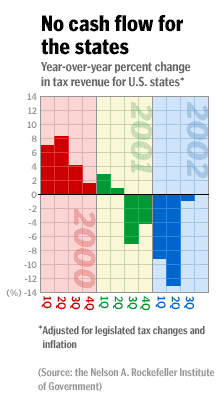NEW YORK (CNN/Money) - President Bush and Congress hope to rejuvenate the U.S. economy this year with a cocktail of tax cuts, spending hikes and other federal programs -- but cash-strapped state governments could water down the federal government's medicine.
On Tuesday, Bush is expected to announce the details of a fiscal stimulus package that could pump $300 billion into the economy in the next ten years, mainly in the form of tax breaks. Many economists think the package could boost the economy by about $50 billion this year.
But state governments, strapped for cash because of plunging tax revenue, might counteract the federal stimulus with tax hikes, spending cuts and job cuts -- possibly even wiping out any positive effect of the federal package this year, according to some economists.

"The impact is going to be very significant -- it may shave as much as a half-percentage point from economic growth this year," said Mark Zandi, economist and co-founder of Economy.com.
Zandi estimates the states' efforts to fix their budget woes could sap about $50 billion from the economy in 2003 -- matching an estimated $50 billion in federal stimulus this year.
Other economists disagree, saying states likely won't take such drastic measures, that an economic recovery will help state tax revenues recover with little help at all.
"State and local budgets can be corrected by small changes in the relative growth rates of spending and tax revenues, rather than by jarring policy initiatives," Salomon Smith Barney senior economist Robert DiClemente said in a research note.
Still, states are in their worst fiscal shape in decades, according to some measures.
Beginning in the third quarter of 2001 -- when the Sept. 11 terror attacks helped worsen a recession that had existed since March -- state tax revenue began to fall and has fallen on a year-over-year basis in every quarter since, according to data compiled by the Nelson A. Rockefeller Institute of Government.
"The drop in revenue is the worst since data have been collected -- since World War II," said Scott Pattison, executive director of the National Association of State Budget Officers in Washington, D.C., a group that researches state budget practices and helps budget officers form policy.
And that pain could be worsened by federal government tax cuts, which could shrink the amount of taxable income into which states sink their hooks. For example, a dividend tax cut, widely expected to be part of Bush's proposal, will cut federal taxable income, and many states use federal taxable income as the basis for their taxes.
Rainy day funds dry up
Last year, many states were able to use rainy day funds, cigarette-tax hikes and other politically painless measures to fill the budget gap caused by a drop in revenue.
But states also increased taxes by a total of $9.1 billion, according to the National Conference of State Legislatures, the first such net gain since 1994 -- a trend that could pick up steam this year, with rainy day funds dry and other politically painless options gone.
"They really are at a point where the easy stuff to do has been done, so now the choice has become between tax increases and fairly stringent cuts in programs," said Pattison.
Pattison did note that political constraints and worries about the negative economic impact of such painful measures could delay them for some time and that states might try other last-chance measures -- including hikes in fees and college tuition -- before swallowing bitter tax-hike or spending-cut pills.
But such a day of reckoning is closer than ever, especially since state governments -- unlike the federal government -- must have a balanced budget every year.
The unthinkable becomes thinkable
"A lot of the things that until now seemed unthinkable are starting to be thinkable," said Nick Johnson, director of the state fiscal project at the Center on Budget and Policy Priorities, a Washington think tank that focuses on issues affecting lower-income families.
"It didn't seem likely that states would take health insurance from a million people ... but that's what a number of states have done and are proposing to do -- and that's just the tip of the iceberg," Johnson added. "They have to balance the budget somehow."
With that potential political pain in mind, some legislators have already suggested that state help be part of a federal stimulus package, and it's increasingly possible that Bush will agree -- especially if such a measure helps win Democratic support for the package.
"Part of the program may include relief for states ... so the drag may not be as large from the state side," said Merrill Lynch senior economist Gerald Cohen, who also noted that spending on the military and homeland security will give an additional boost to the economy. "You definitely will see some drag from the states, offsetting the stimulus from the federal side, but it won't be enough to totally offset the federal side."

|

